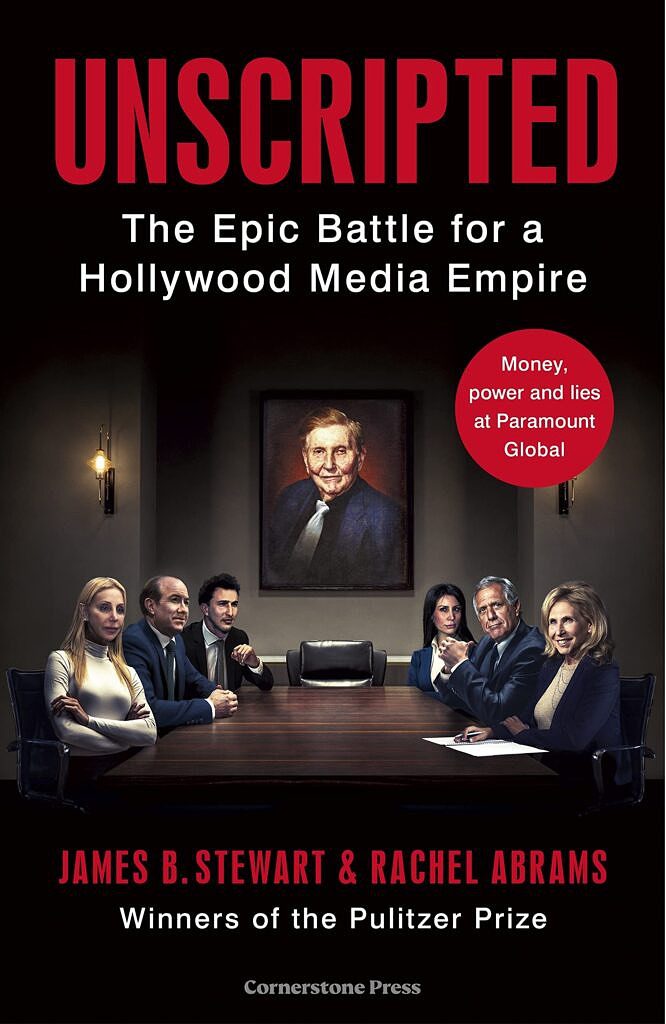
Subtitled “The Epic Battle for a Hollywood Media Empire,” Unscripted is an incisive book. Like a surgical operation, it meticulously dissects its subject, the recent history of one of Hollywood’s five major studios: Paramount Pictures. In so doing, it also paints a (black) picture of the current state of America’s creative industries — and, as this case shows, some of their serious dysfunctions.
In today’s cultural industries and creative economy, Paramount is one of Hollywood’s major “studios” (one of the “Big Five” along with Universal, Disney, Warner, and Sony). Like its competitors, Paramount, also known as Viacom-Paramount-CBS, comprises a historical film studio, a content production system, a streaming service (Paramount +), a US television network (CBS), an important cable network (Showtime), and specialized channels (MTV, BET, Paramount Channel, Nickelodeon, Comedy Central, etc.), not to mention other related entities (e.g., Simon & Schuster, the prestigious New York publishing house). Apart from Sony, whose parent company is Japanese, thus depriving it of US television broadcasting rights, the five principal studios are organized rather similarly in terms of entities and subsidiaries.

This production model is both highly centralized (the studios operate like investment banks, eventually recouping intellectual property, i.e., copyright) and highly decentralized: each studio subcontracts its production to specialized units or to dedicated or independent production companies. These “specialized units” include Pixar, Marvel, Focus Features, Miramax, Dreamworks, and hundreds of other companies, whose names appear in the credits of the films produced by the major studios. American cinema therefore no longer necessarily pits majors against independents, but instead involves cooperations between these two worlds, which are very often inextricably intertwined.
Three major developments have disrupted this system in recent years. First, cultural globalization, which has transformed studios once strongly anchored in the Hollywood model into a global system. Paramount is now called Paramount Global, affirming the studio’s ambition and its international, expansionist aims. Its franchises are distributed worldwide, such as Top Gun, Mission: Impossible, Star Trek, Indiana Jones (whose fifth installment, Indiana Jones and the Dial of Destiny, is scheduled to premier in June 2023, without Spielberg’s involvement and now distributed by Disney, which has bought Lucasfilm). Paramount also boasts a neat catalog of TV series (including CSI, NCIS, or Homeland).
The second major transformation is digitalization. Since the emergence of the Netflix phenomenon, around 2007, streaming has forced studios to distribute their content directly via alternative online platforms: “Disney +” (Disney) ; “Peacock” and “Universal +” (Universal); and correspondingly “Paramount +” (Paramount). Paramount lags considerably behind its main competitors (Netflix, Amazon, and even Disney). It has only about 60 million subscribers worldwide, compared to Netflix’s 230 million and Disney’s 160 million (Amazon totals around 200 million, but the figure is artificially inflated by Amazon Prime subscribers).
While Paramount’s catalog and number of IPs (intellectual property) roughly matches Disney’s, its platform limps far behind in terms of subscribers. Initially, Paramount’s managers did not believe in streaming and were too slow to invest in this sector, preferring to reward their shareholders with exceptional financial returns, rather than invest in digital technology and streaming. This delayed launch is now proving very costly.
The third development, which proves more complex to analyze, is financial capitalism. As mentioned, the film and audiovisual majors are essentially banks and hence concerned less with content than with shareholder returns. Viacom, the former parent company of Paramount and CBS, split its two entities — largely for financial reasons and to boost its return on investment. While the two boards of directors remained similar, the two companies became disconnected. “Despite splitting Viacom, nothing had really changed when it came to corporate governance,” write James Stewart and Rachel Abrams in Unscripted. They show above all that instead of investing in “talent,” Paramount executives preferred to buy stocks…
To increase margins, Paramount also chose to “burn the furniture,” as the Americans say: assets were sold to flush massive amounts of cash into the company, to better redistribute dividends to shareholders. Unfortunately, these sales also came at the expense of investment and innovation.
All these changes — and delays — took place over the last two decades under the “The Godfather,” American billionaire Sumner Redstone, the Viacom CEO and founder of Paramount Global (he died at the age of 97 in August 2020). Unscripted details how the studio collapsed in the final years of this charismatic leader’s life, and how the last Hollywood mogul failed to adapt to the spirit of the times.
Before Unscripted, James Stewart, a New York Times journalist, had written a remarkable book on Disney (Disney War, 2005). He now repeats that feat, by looking at Paramount, with Rachel Abrams, a fellow NYT reporter.
Unscripted is deeply depressing and dispiriting. It is a rare case study on the collapse of a major studio during the greatest transformation ever in film and television history. Instead of understanding the ongoing digital transition, and rather than innovating and transforming, Viacom and Paramount executives favored crazy financial schemes and short-term profitability over long-term innovation. They committed multiple serious financial errors with the sole aim of increasing shareholder income. They also neglected the interests of the group by protecting Paramount executives, despite repeated warnings about numerous cases of sexual harassment, abuse, and assault.
As readers, we witness, as if we were insiders, the incredible financial and sexual abuses committed by two “womanizers” (Sumner Redstone, but also Leslie Moonves, the CBS chairman) and by members of their entourage. The many villains include Shari Redstone, Sumner Redstone’s daughter and heiress, or Philippe Dauman, the CEO of Viacom, a beloved, yet ultimately betrayed spiritual son. Dozens of trials are reported, over financial conflicts, abusive dismissals, and sexual assaults (involving some twenty women, including prostitutes, divorcees, fake heiresses, and high-class escorts). Reading Unscripted, which runs to 390 pages, leaves one absolutely stunned by the scale of sexual violence (described in detail), although perhaps even more by the casualness with which billionaires gamble their fortunes at the expense of cinema, shareholders, and the public.
Paramount is a family story. Sumner Redstone rules his family like a patriarch (his daughter Shari took over the reins of the group after his death, with his children and grandchildren, and even his son-in-law, being promoted to different levels of the organization). He treats Leslie Moonves and Philippe Dauman like sons. We are, as James Stewart and Rachel Abrams repeat, in the ruthless universe of The Godfather (a Paramount film), where only loyalty prevails. The inevitable consequences are nepotism, silence, and omerta. (Over the years, Redstone amended his will over forty times, adding or removing beneficiaries, depending on his libidinous conquests and his countless mistresses).
Everything centers on the “casting couch,” a meanwhile famous Hollywood phrase basically meaning “sex in return for a job” (an actress is usually promoted after having sex with a studio executive, in this case essentially Sumner Redstone and Leslie Moonves — sometimes with her consent and often without). On a few occasions, this neverending sex game led the patriarch to even sleep with the girlfriends of his own grandson (Brandon Redstone)… No mission remained impossible for Sumner Redstone…
Everything else followed: luxury prostitutes, madams, and quick on the heels sexual assault and ultimately rape. Paramount produced Breakfast at Tiffany’s but also Chinatown! (see here the similar scandals brought to light by the “MeToo” movement: Harvey Weinstein at Miramax, Bill O’Reilly and Roger Ailes at Fox News, Charlie Rose at CBS and, more recently, Jeff Shell NBCUniversal’s C.E.O. who has been fired in late April after harassment complaint).
Most strikingly, even spectacularly, the sex scandals at Paramount were not revealed by media investigations, but by group executives settling scores with other executives (Sumner Redstone’s daughter contributed to Leslie Moonves’ downfall after he sought to oust her from the Viacom board). Instead of investing in talent and content, the group will soon be paying millions of dollars to prostitutes to buy their silence…
Regrettably, Unscripted focuses largely on the financial and sexual scandals within the Viacom-Paramount-CBS empire and barely on the evolution of the creative industries in the era of digital transition and global cinema. This is its main weakness: despite a breathtaking and breathless narrative, the book lacks in-depth analysis of the transforming creative industries. Saying that, it likely provides the truest account of what really happened during the Sumner Redstone and Leslie Moonves years. It highlights that Viacom executives ignored the film business, and even more the public, instead indulging their narcissism. While Disney bought Marvel and Lucasfilm to wager its future, Redstone failed to launch Paramount + to challenge Netflix, preferring his “whores” and “fish tanks” to Brad Pitt (as Stewart and Abrams put it). And now, Paramount plans to shut down MTV despite its enduring success between news and entertainment, because it did not anticipate the Spotify and Apple Music phenomena, and because it did not think of a model to reposition MTV.
These sexual affairs, the related financial tensions, and persistent moral harassment entailed innumerable lawsuits. It is hard to keep track of the cases, let alone of the scores of lawyers involved. Reading Unscripted highlights to what extent the creative industries have become an unimaginable playground for lawsuits and the justice system.
As far as the digital revolution is concerned, Stewart and Abrams reveal how Paramount (the same applies also to other studios or music majors) neither saw anything coming nor anticipated anything. The group’s executives kept saying that YouTube would disappear in a few years and that Netflix would remain an epiphenomenon…
On balance, Unscripted paints a bleak picture of American capitalism in the entertainment sector where a small group of majority shareholders managed not only to avoid paying taxes and chose profits over innovation, but also to thwart any development at Viacom-Paramount-CBS and cover up serious financial and sexual scandals. Their antics became indexed as their company’s profits, and vice versa.
What is profoundly shocking about this fascinating book is the casualness with which Viacom-Paramount-CBS executives abandoned the creative industries to obsessively pursue luxury, lucre, and lust. Ultimately, this unexpected development was at odds with the ongoing transformations of the creative economy (digitalization, globalization, and financialization). That development was unexpected, confusing, and ultimately “unscripted.”
(Translated from French by Mark Kyburz)






